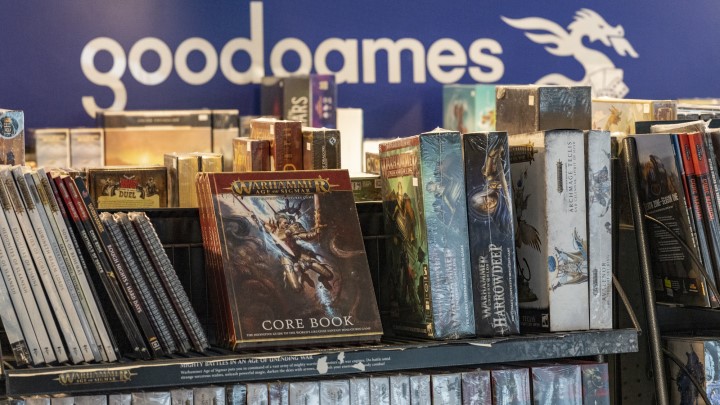For the Australian board game, tabletop game and trading card game enthusiast, Good Games has been a pillar of the community for the past 16 years. Since launching in Sydney in 2006, the chain of hobby game stores has grown to 29 locations across the country, as well as two in the United States. And throughout the pandemic the business saw explosive growth as more Australians turned to games for fun and connection. “Pre-Covid, our stores were performing exceptionally well,” Good Games�
Games’ operations manager Grady Chiu told Inside Retail.
“When everything got pushed online we saw our sales jump 70 per cent in our online retail store, and we had to double the staff we had working on our online trading card game marketplace. And since coming out of Covid that hasn’t dipped, so we’ve really tapped into that market.”
Retail roleplay
Being a hobbyist store, Good Games caters to the niche market of tabletop gaming: games such as Dungeons & Dragons and Pathfinder, as well as board games, such as Settlers of Catan and, ironically, Pandemic.
Board games have become popular enough over the past few years to earn shelf space in larger department stores, such as Kmart and Big W, but this doesn’t bother Chiu. Instead, it provides an opportunity for Good Games to offer a more varied product line in its stores.
However, Good Games stores aren’t just places to browse and purchase products. The business operates two different types of store: a classic retail store and an ‘organised play’ store, where community events, such as trading card game (TCG) tournaments, are regularly held to bring the community together.
Each ‘organised play’ store has tables and chairs, as well as various board games that anyone can come in and use. People can also call ahead to rent out space if they want to run something more organised, like a big session of Dungeons & Dragons for a friend’s birthday.
“We’re a community-driven business, and that organised play factor definitely helps. We’re kind of known for it,” Chiu said.
“When we open a regular retail store, people to this day ask us if we’re going to be hosting events and tournaments there. But really, we view our retail stores as our feeder stores. You might have a mother and child come in to check it out and buy something, and we hope that they’ll eventually come to an organised play event to join the community.”
This two-pronged approach goes beyond Good Games’ physical stores, with the retailer also running two separate online stores: one dedicated to selling products online, and another focused purely on competitive trading card games.
On TCG.GoodGames, the business sells booster packs, as well as individual cards, for a number of the biggest trading card games, such as Magic: The Gathering and Yu-Gi-Oh!, and buys single cards back from customers, which are then resold.
It’s a way for members of the TCG community in Australia to pick up the missing cards they need to make a particular deck function without buying booster packs and hoping to get what they need.
“The business generates a lot of income by buying up unwanted singles and then reselling them, and it creates a sort of engine,” Chiu said.
Good Games also provides a service where it values cards based on how well they have been protected and how rare they are, and provide ratings, which community members can use to judge the value of their collected cards.
“We don’t want to compete”
It wasn’t all guts and glory for Good Games throughout the pandemic. A number of stores were forced to shut in Melbourne, where persistent lockdowns made their operation untenable.
And while the business wants to expand and launch more stores, it is being careful not to push smaller players out of the market in the process, and potentially alienate its community.
“We want to open stores in every major city in Australia, but there are generally already game stores there,” Chiu said.
“We don’t want to compete with other game stores. We understand our shortcomings, and know that a lot of people [within the gaming community] view us as a mass-market player. We’re really not. We’re not here to compete, we want to serve communities that want us there.”

